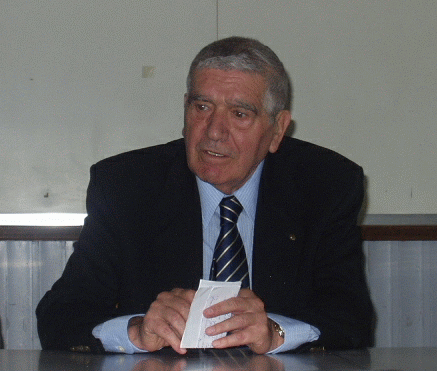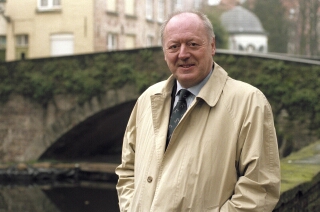

We are pleased to welcome everyone to the first World University Bridge Championship at the Spermalie Hotelschool in Brugge.
Brugge was chosen to be cultural capital of Europe in 2002: It was the wish of the World Bridge Federation to host these championships here.
A total of 13 nations have sent teams to these championships, two of them from outside Europe.

Constantin Anastassov is very pleased to see Bridge enter the FISU fold

The title of Cultural Capital of Europe brings to the cities that receive the honour a number of positive bonuses. Not only are the international spotlights directed at the city for a full year, the city also receives the opportunity and means to realize a number of permanent projects of cultural and social importance. The project Brugge 2002 has not only brought us a rich cultural calendar. The many subsidies have also brought about a giant wave of restoration in our city. Attention for our historic heritage, but also modern building projects have been created and have a special symbolic value in the historical center of the city. The big Concertgebouw, the bridge by Jürg Conzett and the pavillion by Toyo Ito: they are prominent signals that indicate that Brugge, known as a historical city to be seen, is also an active and modern city of Culture.
As a consequence, our city, known as a fine keeper of valuable works of art from the past, has now again become a city of art and cultural craft. Artists from Brugge and the world find here their Muze and an attractive place to work.
Another pleasant consequence of Brugge 2002 is that lots of important (international) institutions and corporations wish to hold their congresses and activities in the Cultural Capital of Europe. This allows us to welcome an international audience, something which enriches us and links wonderfully to the cosmopolitan past of the city. That is why we are honoured that this August we are able to be host to the World Bridge Federation. We welcome all organisers and competitors with all our hearts.
May the character, the atmosphere and the charm of our city bring an extra dimension to this championship.
And may you take home with you, next to the pleasure that the Game of Bridge gives you, the pleasantness of Brugge as a fine souvenir.
Dames en Heren,
As alderman of the city of Bruges and on behalf of the burgomaster Patrick Moenaert, it is my pleasure to welcome you to our city. I am sure that none of you is a complete stranger to Bruges. Indeed, this city has a glorious past and we can find traces of its once prominent place in Europe throughout the city centre. In the early Middle Ages, Bruges became one of Europe's most important trade centres. Our city became a meeting place for merchants, artists and philosophers from all over Europe.
In the year 2000, the city was officially added to UNESCO's World Heritage list and our monuments attract more than 3.5 million tourists every year. A number to be proud of, but we have always tried to encourage tourism without making Bruges into some kind of Disneyland. This city must remain a place to live in; it must however also claim its place in Europe as it did in the past. The combination of these factors has led to a new vision for the development of Bruges: a vision that shifts the focus from atmosphere to culture as part of a European plan for the future of the city. And this vision is also expressed in the BRUGGE 2002 programme.
It is with great pleasure that I welcome the organisers of and the participants in the World University Bridge Championship to Bruges. I am convinced that the city's charm, character and atmosphere will give the championship an extra dimension. And I hope that, apart from the joys of the game, you will also remember the beauty of the city! As Cultural Capital of Europe, Bruges is your perfect host. I hope that your stay in Bruges will give you a lot of inspiration. I want to wish you a pleasant stay and I want you to know that you will always be welcome here.
Next year the European University Championships will be held in Wroclaw, Poland, but using a different formula. Instead of one team per country, the event will be open to all Universities (and other high schools)
This year the Polish Bridge Union organizes the first Polish Open University Championship in a similar formula (any high school across Europe may send more than one team).
This event will be held from 19 to 22 September, also in Wroclaw (Southern Poland).
Programme:
19-20 Sept.: 3 sessions pairs (1st session starting at
14:00)
20-21 Sept. : teams - qualifying
22 Sept. teams - finals & IMP
Pairs
The entry fee is 95 PLN (about 25 EUR).
Information: [email protected]
The idea to organise Championships for University Students originated with Lode Lambeets, of the University of Antwerpen, after he had seen the organisation of the University Chess World Championship in Antwerpen in 1992. He contacted Paul Magerman, then president of the European Community Bridge League, and between them they put together the first European Union Bridge Championship.
Support was sought and received from FISU, the International Federation for University Sports, and from the University of Antwerpen. Both of these continue their support for this championship until this very day.
Since a student's career is hopefully a short one, The European Community Bridge League decided to make this an annual event.
The ECBL, renamed European Union Bridge League in 1995, was dissolved in 1998. Among the assets it transferred to the European Bridge League were these championships and the EBL needed no persuasion to continue the University Championships under its banner.
In 1999 it was decided to turn the European Championship into World Championships in even-numbered years and the first such event was held in 2000 in Maastricht, where it was incorporated into the Olympiad.
That event was not officially recognised as a "World Championship" by FISU, but now that recognition has been given, and today witnesses the start of the first World University Team Championships.
As Antwerpen was also European Capital of Culture for 1993, the Portuguese delegation asked to host the second staging of the event in 1994, when Lisboa would be the Cultural Capital.
At that time it was suggested to hold the championships each year in the Capital of Culture, but it proved impossible to host the championship in 1995, when Luxembourg was the European Capital, because the country sadly had no university of its own.
The Danish Bridge Union agreed to stage the third event, but decided to move the venue away from the European Cultural Capital for 1996, København, to Århus and a venue very well suited for the event.
The fourth championship was held in 1997 in Palermo, Italy, at the request of Primo Nebiolo, president of FISU, to coincide with the World Universiad.
Stockholm was the European Capital for 1998, and the Swedish Federation hosted the event, but again held it away from the capital in Skövde.
In 1999 the event returned to the Capital of Culture, Weimar.
Too many cities applied to be European Capital in the symbolic year 2000, and so the European Union decided to award them all the title (for those interested, the list is at the back of this bulletin). The first World University event was held in Maastricht, in conjunction with the World Team Olympiad.
In 2001 and 2002 there is more than one Cultural Capital. Last year Rotterdam shared this honour with Porto and The Erasmus University of Rotterdam was chosen to host the seventh European University Championship. This year Salamanca and Brugge are Cultural Capitals.
Graz is the Cultural Capital for 2003 but sadly the Austrian Bridge Federation could not be persuaded to host the University event. Wroclaw in Poland has already offered to take up the hosting for the eighth European University Championships.
In 2004, Genoa and Lille share the honour of being European Capital of Culture, but in all likelihood, the second World University Team Championships will be held in Turkey, together with the Olympiad that is being planned there.
11 nations sent teams to the first championship in 1993. Not bad considering that the Community had only 12 members back then. Only Ireland and Luxembourg could not manage a team, but Israel, a regular invitee to Community Championships, was there. Israel won the round robin, but lost the semi-final to the eventual winners, Germany.
Great Britain won the other semi-final from the Netherlands. There was no match for third place, and two bronze medals were awarded.
In 1994, only 9 countries were present, with Greece and Israel being absent. Denmark beat Germany in the final. The Netherlands kept Portugal from the bronze medal.
In 1996, the organisers accepted a team from Norway, even if their country was not a member from the European Union. Sadly this only brought the participation up to 8. The Netherlands defeated Norway in the final, with Denmark beating Germany for the Bronze.
The Netherlands won again in 1997, again with a field of 8 nations, beating the Italians in the final. Germany beat Great Britain for the Bronze. But even winning two years in a row was not enough to have any players that could at that time say they won this championship twice.
Denmark won their second title in 1998, beating Italy in the final. Lars Lund Madsen became the first player to win the event twice. Great Britain beat Germany for the bronze. Despite the enlargement of the European Union, the only newcomer was Sweden, and the field was only 7 strong.
The Netherlands became the first country to win the event for a third time, when they won in 1999. We had a second double winner in Simon De Wijs, who had participated in all 6 championships except the one that the Netherlands had won in 1996.
The expansion outside the European Union was witnessed by the first participation of Poland and Romania
Then in 2000, the event became a world wide one, but also five new European countries made their first appearance: Austria (who won the event), the Czech Republic, Yugoslavia, Ireland and Latvia.
Last year, Estonia and Turkey made their debut. The Netherlands won their fourth title, and Frank Burghout followed in the footsteps of his captain by becoming the third player to win the championship for a second time.
Medal table after 8 championships: (G-S-B)(other placings)
the Rest of the World (1 championship)
Initiative of Melina Mercouri, then Greek minister for Culture
1985 Athina
1986 Firenze
1987 Amsterdam
1988 Berlin
1989 Paris
1990 Glasgow
1991 Dublin
1992 Madrid
1993 Antwerpen
1994 Lisboa
1995 Luxembourg
1996 København
1997 Thessaloniki
1998 Stockholm
1999 Weimar
2000 Avignon, Bergen, Bologna, Brussel, Helsinki, Krakow, Praha, Reykjavik, Santiago de Compostella
2001 Porto, Rotterdam
2002 Brugge, Salamanca
2003 Graz
2004 Genoa, Lille
2005 Cork
2006 to 2019 countries already selected, cities to be decided (2006 NL, 2007 Lux, 2008 UK)